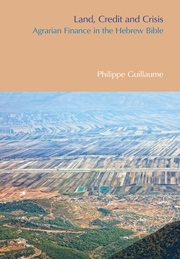5 - Agricultural Credit
from Part II - Credit
Summary
Because farming entails a time gap of several months between the investment in seeds and work before the harvest, a gap that swells into years when animals and trees are involved, credit is essential to farmers. Credit is also necessary to smooth climatic shocks, the risk involved in growing plants and raising animals and the mortality of breadwinners. Hence, lending and borrowing are often mentioned in the Bible, but there is a long history of misunderstanding of the effects of credit.
When Theologians Write about Ancient Credit
Prophetic invectives read in light of Marxian categories serve both as the primary source of the narratives and the interpretative method to reconstruct the plight of biblical peasants. In short, the good prophets of social justice fought the exploitation of the poor by the rich. It is crucial for self-proclaimed ‘social-science’ readings to date prophetic social critiques early to avoid the disturbing suggestion that they were penned to explain major political downturns after the fact. Were Amos' critiques of social oppression ‘more closely connected with Jewish and Christian idealization of the godliness of the poor’ (Levin 2003: 327), an entirely different light would be cast upon these texts and the class-struggle romanticism of the exegetical defenders of the poor would appear as a theodicy à la Job's friends.
- Type
- Chapter
- Information
- Land, Credit and CrisisAgrarian Finance in the Hebrew Bible, pp. 111 - 149Publisher: Acumen PublishingPrint publication year: 2012

